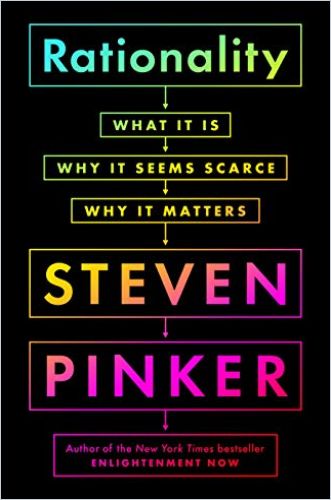Harvard professor Steven Pinker teases out another one-sentence idea into a compelling, immersing and revealing look at the power – when people remember to apply it – of rational thought.

Think! (Slowly)
Bestseller and Harvard professor Steven Pinker is one of Foreign Policy’s Top 100 Global Thinkers and Time magazine’s 100 Most Influential People. He addresses the flaws in human thinking and offers practical remedies. Pinker points out that pestilence, starvation, slavery and violent death have declined enormously because of humans’ ability to reason.
Despair
Fake news, conspiracy theories, climate-change denial, rejection of vaccinations and belief in ghosts and extrasensory perception (ESP) are only a few of the many pitfalls Pinker cites as impediments to rational thinking. Even so, under normal circumstances, he insists, most people apply logic and reasoning fairly well.
It’s become conventional wisdom that people are simply irrational.Steven Pinker
Through reasoning, humans solve problems and overcome enormous challenges. Humankind has nearly eliminated abject poverty, doubled human life span, reduced lives lost from famine or wars, invented vaccines, medicines and other cures for diseases, and made everyday life much safer.
Most people think soundly when presented with relevant information in a descriptive, concrete format. They employ what psychologist Daniel Kahneman calls “system 2 thinking” – slow thinking – in which you take stock, analyze details and make considered decisions. “System 1 thinking” – fast, unconscious and intuitive thinking – can fool you into faulty choices. You see a pattern, and jump to an answer.
People struggle most, Pinker maintains, when estimating probabilities. When you dream and something proximate happens in real life, you might connect the two, ignoring the countless times your dreams did not come true. When you read stories about immigrants committing crimes, or about shark attacks, you tend not to consider how many citizens commit crimes, or how few people sharks bite compared to how many people die in car accidents en route to the beach.
Resistance to obvious answers and employing slow thinking, Pinker makes clear, resolve most cognitive biases and problems.
Reason
When you want something, you apply reason to get it. This obvious truth – that only through reasoning do humans better their conditions – sustains modern society. Pinker regards the procedural justice system, the scientific method, peer-review in academia and journalism fact-checking as guardrails that encourage deliberate thinking – often in groups – which improves decision-making.
None of us, thinking alone, is rational enough to consistently come to sound conclusions; rationality emerges from a community of reasoners who spot each other’s fallacies.Steven Pinker
Critics unfairly label certain behavior and choices as irrational. People might spend now and fail to save for the future, for example, because they discount their odds of growing old. So, they ask, why save money for a time that may never come? A person might take an expensive trip when they’re 30, believing it’ll be more fun than if they wait until they’re 70 to travel. These decisions remain logical and rational if you don’t overly discount the future. At the same time, Pinker cautions, if you buy extended warranties, your aversion to loss may drive you to a bad choice – salespeople are well aware of this.
Recognize when societal taboos and morals lure you into collective irrationality, for example, by not signing your organ donor card. Pinker seems to be deliberately provoking readers when he argues that government might save lives by establishing a legal market for kidneys. Consider, Pinker says, that you have no need for two kidneys and consider the number of people who die each year waiting for one. Given the intelligence of most of Pinker’s positions, this seems just plain silly.
Coincidences happen all the time, especially when you seek them out. If a researcher scours data looking for a certain pattern, he or she will always find one. Suppose 10 among 1,000 firms hired graduates from three specific colleges over the past three decades and those firms’ stocks outperformed the other 990 by an average of 20%. Wow! But if your neighbor shot an arrow into the side of a barn and then painted a bull’s-eye around it, would that impress you? For a finding to mean anything, researchers must put forward a hypothesis before looking at the data, just as a sharpshooter paints the target before shooting.
Correlation and Causation
Rich countries may have more happy people, but no one can accurately predict the level of happiness in a country based on its wealth, nor can you say that wealth alone determines happiness. Kids’ heights may correlate with their parents’ heights, but kids of tall parents will usually end up shorter than their parents’ average height. Kids of short parents will grow taller than their parents’ average. This “regression to the mean” applies to all things.
Many factors bear on most events, making straight causation extremely rare. Experiments using randomized controlled trials (RCTs) combined with multiple regression analysis offer the best means of determining degrees of causation. They remove most of the noise from data samples and test multiple factors, one at a time, while holding the others constant.
Evidence
Big claims require big evidence. When the stakes are high, Pinker urges you to lean toward meticulous thought and more conservative decisions. If you work for an aerospace company, for example, and see dots on your radar screen that could be bombers or birds, scramble the interceptors just in case. The costs of responding to a likely false alarm prove less consequential than ignoring it.
The signal detection challenge is whether to treat some indicator as a genuine signal from the world or as noise in our imperfect perception of it. It’s a recurring dilemma in life.Steven Pinker
Many everyday decisions resemble bombers versus birds in their difficulty. To practice more effective thinking, consider arguments that collide with your beliefs, then revise your beliefs according to the evidence.
Witty and Comprehensive
Stephen Pinker is, for a big-brain Harvard guy, more than willing to entertain. He also can’t help being a nerd, and so includes pages-long examples, usually including numbers and percentages, that prove incomprehensible to all but other nerds. Pinker doesn’t write down to his audience; he pulls you onto his level of sophistication while maintaining surprising readability. That someone of his intellect and worldliness can remain optimistic about human rationality, is, given the state of the world today, simply inspiring.








